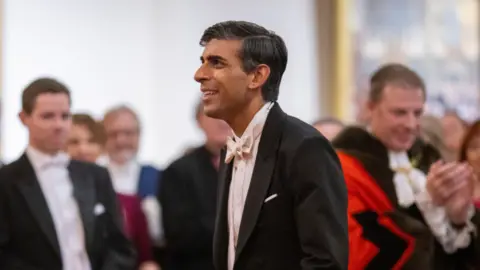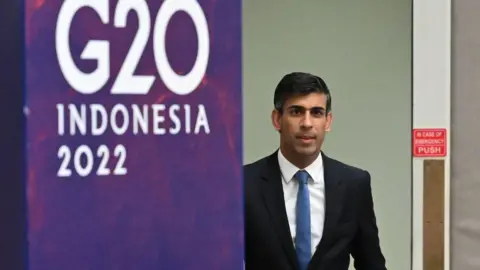Rishi Sunak sets out China policy as Tory critics loom

 EPA
EPAChina is a growing superpower, with a wildly different worldview and totally different set of values to the UK.
So how should the government manage its relationship with Beijing?
In Rishi Sunak's first major speech on foreign policy as prime minister, he said his approach would not be one of "grand rhetoric" - which sounds just a little bit like a gentle pop at one Boris Johnson - but "robust pragmatism".
What on earth does that mean?
Mr Sunak acknowledged that "China is conspicuously competing for global influence using all the levers of state power".
He also said it was "naïve" to think "trade would lead to social and political reform".
Talking of gentle pops, without referring to anyone in particular, you might remember seven years ago, and four prime ministers ago, David Cameron took President Xi of China for a pint at a pub in Buckinghamshire.
The argument then was that the best way to engage with China, both economically and diplomatically, was to extend trading relationships.
The then-chancellor, George Osborne, even said London's relationship with Beijing was entering a "golden era" - something Mr Sunak said directly and definitively was "over".
But he still wants to warm the relationship up, compared to where it's been in the meantime.
When Mr Sunak's team briefed us reporters at the G20 summit in Indonesia ahead of a planned meeting with President Xi, we were reminded that it had been over 18 months since a British prime minister had even spoken on the phone to the Chinese president.
And you have to go back to Theresa May's time in Downing Street for the last face-to-face meeting, when she travelled to Beijing early in 2018.
As it happens, the formal meeting in Bali between Mr Sunak and President Xi got cancelled because both leaders' diaries were upended by the missile that landed in Poland, killing two people and briefly sparking concern of a confrontation between NATO and Russia.
Instead, the two leaders managed a quick hello but nothing more - but a proper meeting was very much what the prime minister wanted.
Rishi Sunak's argument is the UK "simply cannot ignore China's significance in world affairs," as it extends to economic stability, climate change and food security.
In short, he says, these issues can't be substantively addressed unless there is a relationship with Beijing.
Labour describe this ebb and flow of the instincts of various recent prime ministers as the government "flip-flopping its rhetoric on China."
 PA Media
PA MediaBut what might this new relationship actually look like? Or, to get back to where we started, what does "robust pragmatism" actually mean?
His critics are quick to offer a view.
One of his predecessors as Conservative leader, Sir Iain Duncan Smith, is blunt.
Sir Iain is one of a handful of parliamentarians banned from China after criticising its treatment of the Uighurs.
Writing in the Daily Express, his critique of the Prime Minister's approach could hardly be more blunt. "I wonder if robust pragmatism now sounds more and more like appeasement," he wrote.
In short, he thinks Rishi Sunak has gone soft on the issue.
Complex and nuanced
The truth is, right now, we don't know in practical terms what this new approach will actually amount to.
Mr Sunak is promising more detail in what is known as the Integrated Review - which will set out the UK's national security and foreign policy - in the new year.
But we know already how China is now described: a "systemic challenge".
The government hopes that people will understand that international relations, like any human relations, are complex and nuanced; that a binary approach, as they see it, would not be in the UK's interests.
But for the prime minister's critics, failing to describe Beijing as a "threat" is a big mistake.
